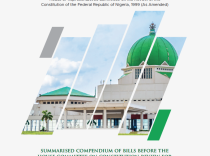The Senate and House of Representatives at its Emergency Plenary Session of Thursday, 28 May 2020 debated the general principles of the proposed Revised 2020 Budget presented by the President. The Bill seeks to authorize the sum of N10,509,654,033,053 from the Consolidated Revenue Fund of the Federation as the proposed expenditure of the Revised 2020 Budget.
The Revised 2020 Budget Expenditure comprises of:
- Recurrent (Non-Debt) Expenditure of N4,928,525,467,849
- Statutory Transfer of N398,505,979,362
- Debt Service of N2,951,710,000,000
- Development Fund for Capital Expenditure of N2,230,912,585,842
The proposed expenditure is predicated on an Oil Benchmark price of $25 per barrel, an Oil Production estimate of 1.93 million barrels per day and an Exchange Rate of N360/$.
Leading the debate on the revised budget, the Leader of the Senate, Sen. Yahaya Abdullahi (APC: Kebbi) informed lawmakers that in a bid to reprioritize spending, some non-essential and deferrable expenditure (especially those classified as Administrative Capital Expenditure) had been reduced to fund economic growth initiatives, pro-poor expenditures and social sector investments in order to combat the COVID-19 pandemic as well as its negative impacts on the economy. This position was also supported in the House of Representatives, by the Majority Leader, Hon. Hassan Ado Doguwa (APC: Kano) who stated that the amendment was necessitated by the current uncertainties and general decline in global economic activities caused by the COVID-19 pandemic and sharp fall in crude oil prices.
The Revised 2020 Budget which is intended to sustain the economy and mitigate the effect of the COVID-19 disease will now be funded with an aggregate revenue projection of N5.09 trillion which is 35% or N2.78 trillion less than the 2020 Budget passed by National Assembly in 2019. 26% of this revenue is expected to be funded from oil related sources while the outstanding sum is to be earned from non-oil sources.
While most lawmakers in both the Senate and House of Representatives spoke in support of the proposals in the revised 2020 budget, there were also calls for:
- The adoption of realistic projections and expenditures;
- A review of the continued existence Excess Crude Account to address issues of revenue leakages;
- An increased budgetary allocation to the Education, Agriculture and Health Sector;
- Creation of stimulus packages that focuses on infrastructure, job creation and economic growth; and
- Retention of the budgetary allocation to the Judicial arm of government.
In addition to the debate on the 2020 Appropriation (Amendment) Bill, both chambers of the National Assembly are expected to consider consequential amendments to a revised 2020-2022 Medium Term Expenditure Framework (MTEF) and Fiscal Strategy Paper (FSP) which were submitted by President Buhari via a letter.
In the letter, President Buhari noted that the assumptions underlying the 2020 Appropriation Act and 2020-2020 MTEF and FSP were no longer sustainable, hence, the need to reallocate resources to ensure effective implementation of required emergency measures and other actions necessary to mitigate against the socio-economic effect of the COVID-19 pandemic.
The Revised 2020 Budget has been referred to the Senate and House of Representatives Committees on Appropriations.





